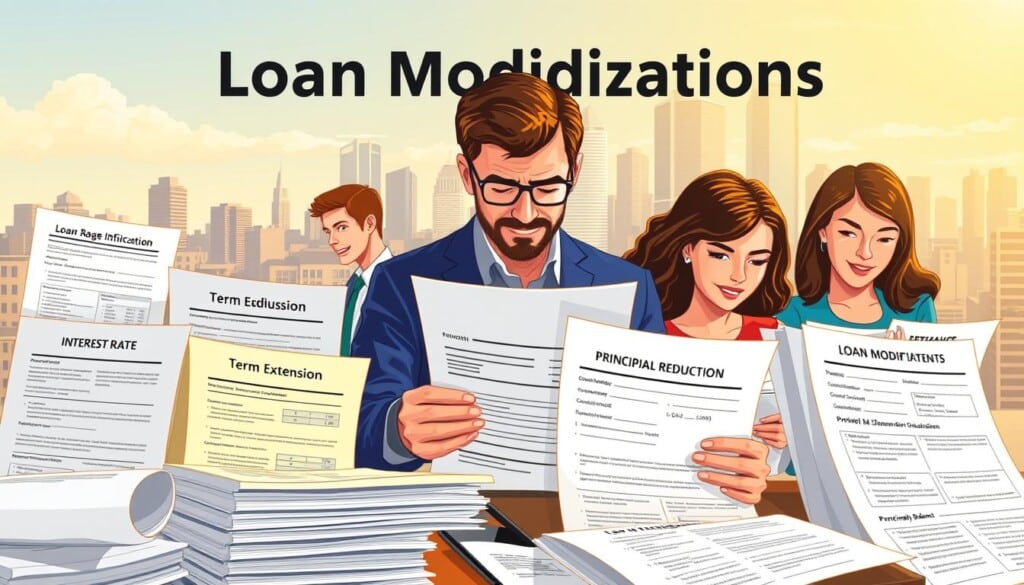Did you know a simple loan modification could save your home from foreclosure? This guide will help you understand loan modifications. Loan brokers are key for homeowners facing financial troubles. Knowing about loan modifications is essential for managing home loans and finding financial help.
With the right strategies, homeowners can avoid foreclosure and improve their finances.
Key Takeaways
- Loan modifications provide essential financial assistance for struggling homeowners.
- Understanding the types of mortgage options is vital for effective decision-making.
- Awareness of the foreclosure prevention measures is critical for home retention.
- Determining eligibility criteria aids in navigating the loan modification process.
- Engaging with lenders is an important step in securing loan modifications.
- Local resources offer valuable support for homeowners seeking assistance.
Understanding Loan Modification
Loan modification changes the terms of a mortgage to make payments easier for homeowners. It lets lenders and borrowers adjust loan terms, like lowering payments or rates. This helps avoid foreclosure by giving homeowners a way out.
What is Loan Modification?
Loan modification changes a loan’s terms, often lowering payments or rates. It’s different from refinancing because it changes the current loan, not starts a new one. This helps homeowners manage their finances better.
Benefits of Loan Modification
Loan modification has many benefits, like lower monthly payments. This makes it easier to manage money without defaulting. It also saves money in the long run and gives more time to get finances stable.
Common Misconceptions
Despite its benefits, loan modification has myths. Many think only those in default can apply, but lenders consider current payments too. Another myth is needing a lawyer, but many succeed without one. Knowing these myths helps borrowers make better choices.
For help with loan modification, check out LocalZ. It offers tips and connects you with local experts.
The Loan Modification Process
Understanding the loan modification process is key for homeowners facing financial trouble. It involves several steps to help borrowers explain their financial situation to lenders. Being prepared is important to increase the chances of getting mortgage relief.
Step-by-Step Overview
The first step is to assess your financial situation. You need to gather all important financial information. This includes your income, expenses, and debts.
Then, you should talk openly with your lender. Explain why you need a loan modification because of financial hardship. Each step is important to build a strong case for your request.
Key Documents Required
Gathering the right documents is a critical part of the loan modification process. You’ll need to show proof of your income, like pay stubs or tax returns. Also, you’ll need to provide statements of your debts and monthly expenses.
A hardship letter is also important. It explains why you need a loan modification. This personal touch can help lenders understand your situation better.

Eligibility Criteria for Loan Modification
Homeowners looking for loan modification help need to know the rules first. They must meet certain criteria and follow specific requirements. It’s important to show that they are facing financial difficulties to qualify for assistance.
General Requirements
To get a loan modification, homeowners must show they have a steady income. They also need to be current on their loan payments and willing to work with their lenders. Lenders ask for documents to check income and expenses.
This helps lenders decide if a homeowner can get their loan modified.
Financial Hardship Factors
It’s key to understand what financial problems qualify for help. Issues like job loss, medical bills, or big income drops are common. Homeowners should explain these problems to their lenders.
By sharing how these issues affect their finances, they can improve their chances of getting loan modification help.
Types of Loan Modifications
Borrowers have many options to change their loan terms. Knowing about different loan modifications can help homeowners make better financial choices. This section will cover interest rate reduction, term extension, and principal forgiveness.
Interest Rate Reduction
An interest rate reduction lowers the percentage rate on the loan. This can make monthly payments much lower. It helps homeowners who are struggling financially to keep their homes.
Term Extension
Term extension means paying off the loan over a longer time. This makes monthly payments smaller. While it may mean paying more interest in the long run, it can help homeowners in tough times.
Principal Forgiveness
Principal forgiveness reduces the loan balance. Sometimes, lenders forgive part of the principal. This can greatly reduce the debt burden for homeowners who owe more than their home is worth.

How to Apply for a Loan Modification
Applying for a loan modification needs careful planning and organization. Homeowners looking for mortgage help must first prepare the right documents. They need to show proof of income, tax returns, and a hardship letter explaining why they need a modification.
Having all the necessary information helps lenders process requests quickly and efficiently.
Preparing Your Application
Getting your documents ready is key in the loan modification process. Homeowners should collect financial statements, bank statements, and other important papers. These show their financial situation clearly.
Lenders want to see solid evidence of why a modification is needed. A well-prepared application can make the lender’s job easier and speed up the review process.
Submitting Your Request
When you submit your loan modification request, be clear and precise. Make sure all your documents are complete and in order before sending them to the lender. Adding a cover letter can help communicate your situation better.
It’s also important to follow up after you’ve sent your application. This ensures the lender knows you’ve applied and helps keep the process moving forward.
Working with Your Lender
Talking well with your lender is key when you’re going through a loan modification. Keeping the conversation clear helps you get the best results. It also helps clear up any doubts you might have.
Homeowners need to know how to talk to their lenders right. This way, they get updates on their loan modification in a timely manner.
Communicating Effectively
Talking to your lender needs to be clear and organized. Start by getting all your documents ready. This makes answering questions faster.
When you call, be straight to the point about what you need. Keep track of your talks with the lender. Note the date, time, and what was said. This makes talking easier and builds trust.
Being proactive is important. It shows you’re serious about following up on your requests.
What to Expect After Submission
After you send in your loan modification, knowing what to expect can help you relax. You should hear back from the lender within a few days. They’ll let you know they got your application.
Then, you might get updates on when they’ll make a decision. Sometimes, they need more info to help them decide. Knowing this helps you stay ready for anything.

FAQs About Loan Modification
Homeowners often have common questions about loan modifications. They want to know about timelines and challenges. Knowing these can make the process easier.
How Long Does the Process Take?
The loan modification timeline varies. It depends on the lender’s workload and the application’s complexity. Usually, it takes 30 to 90 days. Talking to the lender can help speed things up.
Can I be Denied a Loan Modification?
Yes, application denial can happen. It might be due to not meeting the criteria or missing financial documents. Knowing why you were denied helps prepare for future applications.
Alternative Options to Loan Modification
Homeowners facing financial troubles have other ways to solve their problems. We’ll look at refinancing and payment plans as alternatives. These options help homeowners make smart choices for their financial future.
Refinancing Your Loan
Refinancing lets homeowners swap their current mortgage for a new one, often with a lower interest rate. This can cut down monthly payments or change loan terms, giving quick financial help. It’s important to check your credit score and current rates before refinancing, as they affect the outcome.
Payment Plans
Payment plans offer a flexible way for those struggling to pay their mortgage in full. Homeowners can work with lenders to set up a payment plan that fits their budget. This keeps them in their home while improving their financial situation. Each plan has its own benefits and drawbacks, so it’s key to consider them carefully.
Legal Considerations
Knowing the legal side of loan modification is key for homeowners. It helps them understand their rights and protect themselves. This is important for fair treatment by lenders.
Understanding Your Rights
Homeowners have certain legal rights when they ask for loan modifications. These include the right to clear communication from lenders and the right to appeal if denied. They also have the right to all important loan information.
Knowing these rights helps homeowners deal with lenders better. It keeps them from being taken advantage of.
When to Seek Legal Advice
Sometimes, homeowners need legal help, like in tough negotiations or disputes with lenders. If they’re unsure about their rights or feel treated unfairly, legal advice is a good idea. It can clarify things and help protect homeowners.
Local Resources for Homeowners
Homeowners need reliable local resources to navigate loan modifications. Housing counselors offer tailored guidance based on individual financial situations. They help understand available options and prepare needed documents.
Finding Approved Housing Counselors
Finding approved housing counselors is key for homeowners. These experts provide personalized support and help with the application. They answer questions about possible outcomes. Using local resources connects homeowners with certified professionals who know community services.
Utilizing Local Services
Community services are also important for homeowners. Local nonprofits and government programs offer financial education and help. These services make loan modifications easier and help homeowners understand their rights and responsibilities.
Getting Help with Loan Modification
Homeowners facing loan modification challenges need effective support. LocalZ offers a valuable resource, a streamlined online directory. It connects people with local experts ready to help with loan modifications. This way, homeowners get solutions that fit their unique financial needs.
Why Choose LocalZ?
LocalZ is dedicated to helping local businesses and communities. It connects homeowners with experts who know loan modifications well. These specialists offer important advice and support, helping clients make informed choices.
Connecting with Local Experts
Working with local pros through LocalZ boosts your chances of success with loan modifications. It also strengthens community bonds. Local experts know local financial rules and can offer personalized help. Homeowners are encouraged to use LocalZ for reliable support.

